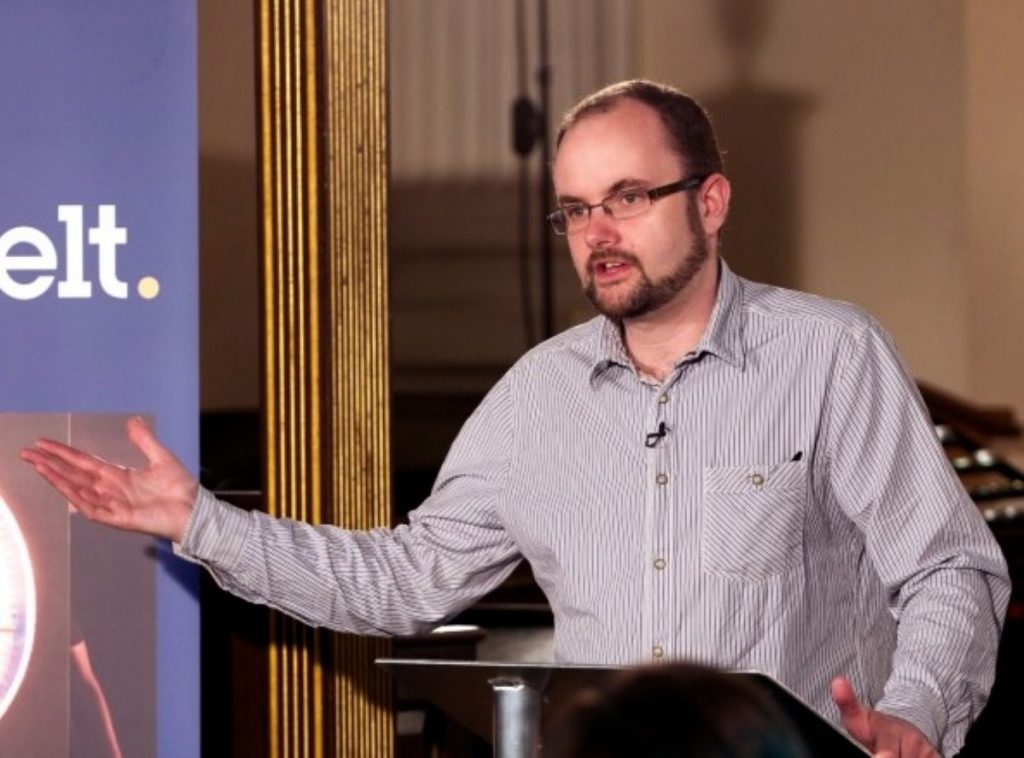Comment: The far-right’s god-whistle politics isn’t going away
By Symon Hill
If you've never heard of Britain First, think of the English Defence League with smarter clothes. Britain First's members wear identical blue jackets as they march through Muslim-majority areas, waving Union Flags and insisting that Britain is a Christian country. They want "our people to come first, before foreigners, asylum-seekers or migrants". They hand out Bibles outside mosques and run "Christian patrols" in east London. They describe this as "Christian resistance".
They're not the only far-right party to use Christian rhetoric. The supposedly respectable wing of the far-right – Ukip – are adept at doing so. Nigel Farage says Britain should be "muscular" in defending its "Christian culture".
Roger Helmer, Ukip's candidate in the Newark by-election, drove around the constituency in a car emblazoned with a list of things he objects to: "HS2, wind farms, gay marriage." There's nothing new about making sexuality into an election issue. Two years ago, Winston McKenzie, standing for Ukip in the Croydon North by-election, claimed (untruthfully) that the other parties wanted to "force" churches to host same-sex marriages. He argued that Christians should vote for him to defend their interests.


The far-right thrives on fear. Repeated comments about immigration and Islam are their standard form of dog-whistle politics. Appealing to conservative Christians is simply a variation on this – god-whistle politics.
Christians in the UK are as divided and diverse as the population generally. Many Christians have campaigned for same-sex marriage just as others have campaigned against it. While most British church leaders are conservative on sexuality and marriage, they tend to be left-of-centre when it comes to economics. Christian groups that condemn gay people hit the headlines. Those that protest outside nuclear bases tend not to.
Nonetheless, I accept that left-wing Christians (such as me) do not do enough to make ourselves heard above the rants of the homophobes or to challenge those who confuse belief in Christianity with belief in a 'Christian country'.
We need to expose the truth about certain Christian groups that are happy to ally themselves with far-right politics. Foremost among them is Christian Concern (previously called Christian Concern For Our Nation).
Christian Concern claims to speak up for Christian values in public life. They are one of the main groups behind the Coalition for Marriage, which has drawn in more moderately conservative Christians and gained significant media coverage with its outrageously untrue claim that the legalisation of same-sex marriages would allow churches to be sued for not holding them. Many middle-of-the-road Christians have been happy to endorse the group's 'Not Ashamed' campaign, which encourages Christians to be open about their faith.
Rumours have long circulated that the leaders of Christian Concern held a meeting by phone with Tommy Robinson when he was leader of the English Defence League. Christian Concern last month had the opportunity to get rid of these rumours, when they were asked outright by a journalist (not me) if they were true. Christian Concern's press officer, after consulting with its leaders, told the journalist that they had no comment to make.
Christian Concern deny being party-political – they had to apologise to their supporters in 2010 when they appeared to endorse the tiny Christian party. But in 2011, the group held a meeting on 'Dismantling Multiculturalism' with Gerard Batten, Ukip MEP for London. Proposals they appear to have agreed on include a ban on kosher and halal food in schools and hospitals, an end to Islamic banking in the UK and a ban on non-English signs in public (Batten has since tried to play it all down, saying these were only ideas). By last year, Christian Concern's bulletins to supporters were commenting on Ukip's local election success in joyful terms.
It's easy to dismiss Christian Concern as a gang of homophobes and fundamentalists. The description is accurate but the dismissal would be a mistake. They are skilled at stirring up fear to build support beyond their natural supporter base. It's a tactic familiar to anyone who has watched the rise of Ukip.
Central to Christian Concern's worldview is the claim that Christians are being discriminated against in the UK. In reality, Britain is the only country in the world in which Christian leaders have a legal right to sit in Parliament and vote on legislation. Faith schools, over 99% of which are Christian, are exempt from several equality laws. But because homophobic guest house owners can no longer refuse rooms to same-sex couples, Christian Concern – to say nothing of their allies in the Daily Mail, Ukip and the right of the Tory party – would have us believe that British Christians are discriminated against.
As someone who spends a lot of time talking to varied religious groups, I am surprised by how even middle-of-the-road Christians now believe that Christians are being treated less favourably than followers of others faiths. As Ukip and Christian Concern both know well, the rhetoric of fear is easily believed.
How can progressively-minded people respond? The very worst thing we can do is to laugh at these people and then forget about them. Progressive Christians, along with people of other religions and none, need to work together to challenge fear and address its causes while never giving in to its agenda. We should know by now that simply waiting for the far-right to go away does not work.
Symon Hill is a Christian writer and activist. His books include The No-Nonsense Guide to Religion and Digital Revolutions: Activism in the internet age, both published by New Internationalist
The opinions in politics.co.uk's Comment and Analysis section are those of the author and are no reflection of the views of the website or its owners.












